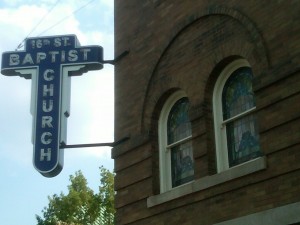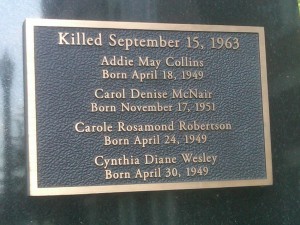Good Morning from Birmingham, Alabama! Yesterday was yet another day of moving, inspiring and heart-breaking discovery in Montgomery and Birmingham. We have visited many important sites along the trail of the Civil Rights Movement in this journey, and each one has so many significant stories to tell. I continue to be captivated by the unyielding faith of the people involved in the movement, and in particular I am challenged to consider the significant role of The Church in the movement. There were few safe places to gather for African-Americans and white advocates in the movement, and in some instances it was made illegal for more than three African-Americans to gather together. Therefore, the churches became the meeting places for organizing, planning, fellowship and mutual encouragement. Mass meetings were an extremely important part of the movement and at these mass meetings there where life-giving sermons and courageous singing, including songs like “We Shall Overcome”, “Ain’t Gonna Let Nobody Turn Me Around”, and “This Little Light of Mine”.
The churches in the movement were extremely courageous and brave to open their doors to this fight for freedom and justice. While they became safe havens in some ways, they also became targets for hatred and violence. Bombings were a normal occurrence in the movement. Yesterday we visited Sixteenth Street Baptist Church in Birmingham, where members of the KKK ignited a bomb on September 15, 1963 taking the lives of 4 young girls, Denise McNair, Cynthia Wesley, Carole Robertson and Addie Mae Collins. If you have the opportunity, please see Spike Lee’s film “Four Little Girls” that tells the story of these four girls and their families.
This journey we are on has challenged me to think about so many things, and the role of the church is at the forefront. The church was a “home base” for the movement and hosted countless mass meetings to strengthen and encourage members of the community. The risk was great, but the outcome was extraordinary. I am challenged to consider our present-day churches. Are we advocating for the rights of God’s children? Are we safe havens for people fighting for freedom and justice? How are we transforming the world around us? 
